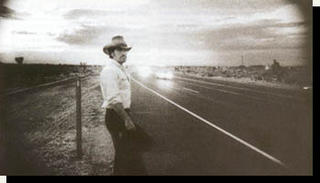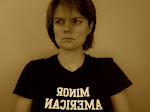

Bruce Springsteen is listed as number 9 for Rock's best songwriters on some AOL list. Dylan is number 1. Ahead of Springsteen are Pete Townshend, Mick Jagger and Keith Richard, Elton John and that Bernie guy. It doesn't make any sense to me. The Who have some great songs, but I don't see them as the greatest of lyricists. Same for The Stones. Elton John has two or three exemplary songs. That's it. And Dylan is great, but there's a cynicism to Dylan that makes it hard for me to like him no holds bar. Though I am fascinate with Dylan to a certain degree, there's something mean-spirited to Dylan in his lyrics sometimes. Springsteen has a real sincerity that I was re-drawn to after the post-punk early nineties where Cobain ruled. I love that music, but it seems that our generation got mired in irony. And Springsteen wasn't scared to be sincere. It seems to me that the post-postmodern era has to deal with irony. LANGUAGE poetry in it's most overtly political forms is ironic (Andrews, for instance), as is indie pop music often; it seems though, that this just leaves things on the level of critique. What I like about Springsteen is that there is a positing of a value system, not just a criticism of one. (This is true of current music like Fugazi and Le Tigre).
I saw his acoustic show recently in LA and he did "Youngstown" a song off Tom Joad, an album and a song I never paid much attention to because I found it not as compelling as Nebraska, and after Nebraska I think Springsteen has a hard time producing his songs in a way that doesn't distract from them. He never really recovers from the eighties high-gloss production, though his latest effort makes me hopeful. I wish Rick Rubin would do for Springsteen what he did for Cash. In any case, when he did "Youngstown" live I could really hear it. Him delivering it on acoustic guitar made it audible to me for the first time. I think it's one of his best songs for the simple reason that it continues a whole history of folk songs in this country. It applies to a contemporary industrial issue while telling the history of both the country and one particular family at the same time. It has the elements of blues too, with references to the speaker's ties with the Devil. Here are the lyrics:
YOUNGSTOWN: Bruce Springsteen
Here in northeast Ohio
Back in eighteen-o-three
James and Dan Heaton
Found the ore that was linin' Yellow Creek
They built a blast furnace
Here along the shore
And they made the canonballs
That helped the Union win the war
Here in Youngstown
Here in Youngstown
My sweet Jenny I'm sinkin' down
Here darlin' in Youngstown
Well my daddy worked the furnaces
Kept 'em hotter than hell
I come home from 'Nam worked my way to scarfer
A job that suited the devil as well
Taconite coke and limestone
Fed my children and made my pay
Them smokestacks reachin' like the arms of God
Into a beautiful sky of soot and clay
Here in Youngstown
Here in Youndstown
Sweet Jenny I'm sinkin' down
Here darlin' in Youngstown
Well my daddy come on the Ohio works
When he come home from World War Two
Now the yard's just scrap and rubble
He said "Them big boys did what Hitler couldn't do."
These mills they built the tanks and bombs
That won this country's wars
We sent our sons to Korea and Vietnam
Now we're wondering what they were dyin' for
Here in Youngstown
Here in Youngstown
My sweet Jenny I'm sinkin' down
Here darlin' in Youngstown
From the Monongahela valley
To the Mesabi iron range
To the coal mines of Appalachia
They story's always the same
Seven hundred tons of metal a day
Now sir you tell me the world's changed
Once I made you rich enough
Rich enough to forget my name
And Youngstown
And Youngstown
My sweet Jenny I'm sinkin' down
Here darlin' in Youngstown
When I die I don't want no part of heaven
I would not do heaven's work well
I pray the devil comes and takes me
To stand in the fiery of furnaces of hell.
+ + + + +
The chord progression in the song really accents the darkness of the lyrics. The verses alternate between Dm and C. The rhythm is played in such a way that the bass note of the chord is played first and then the jangly top of the chord, with the accent on the latter. This brings in the creepy minor blues feeling with an agressive folk rhythm. And then the Chorus where the speaker calls to his lover moves to F -- a brighter sounding chord that makes the invocation even sadder -- as it's the only bright, sweet spot of the whole song. It's the call for "Jenny" after the bitterness of the verses that broke me when I heard him do this song live. And the jangle of the Dm on the acoustic guitar with the way it's broken from bass to chord gives the song the sinister sound that I find very moving, given the subject matter. It's a song about a broken man, in a broken country where the only hope is the hope of his wife and family. It's those values that I appreciate in Springsteen, especially because his traditional value system, at least in his personal view, does not exclude the traditionally excluded. I can go to a Springsteen show and listen to these songs with my girlfriend and still feel included in the songwriter's world view. He and I share the same politics. I feel like Springsteen is the only American icon that does not embarrass me. Given that, I'll end here with a post of my brother and his new "Sweet Jenny."

